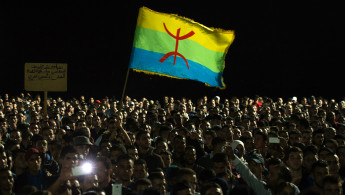Morocco arrests 11 over fish seller's death
The suspects have been brought before an investigating magistrate in connection with allegations of involuntary manslaughter and forgery of public documents, a statement said.
Mouhcine Fikri, 31, was crushed to death on Friday in the truck in the northern city of Al-Hoceima as he reportedly tried to protest against authorities seizing and destroying his wares.
An image of his inert body – head and arm sticking out from under the lorry's crushing mechanism – went viral on social media, sparking calls for protests nationwide including in the capital Rabat.
| Read also: Fishmonger's gruesome death sparks protests in Morocco |
Footage online showed thousands of people following the yellow ambulance that carried Fikri's body through his home town in the ethnically Berber Rif region on Sunday.
The procession was led by a dozen drivers in their cars, including taxis, and marchers waving Berber flags.
"Morocco is in shock. The horrific death of the fish seller has caused tears in the Rif and outrage among Moroccans," the daily Akhbar Alyoum said.
Autopsy results quoted by the media on Monday showed "fractures of the five first ribs left and right" and reported death from "haemorrhagic shock after a chest wound".
A human rights activist said on Sunday that the authorities had forced him to destroy several boxes of swordfish, which is illegal to catch using driftnets.
Fikri threw himself in the truck after his goods were crushed by the machine, Fassal Aoussar from the Moroccan Association of Human Rights (AMDH) said.
It was the self-immolation of a street vendor in Tunisia in late 2010 in protest at police harassment that sparked Tunisia's revolution and the Arab Spring uprisings across the rest of the region the next year.
The AMDH on Sunday warned of a "possible repeat" of the 2011 protests in the Rif, just a week before Morocco starts hosting international climate talks.
King Mohammed VI ordered a "thorough and exhaustive investigation" into Fikri's death and the "prosecution of whoever is found responsible", the interior ministry said.
Agencies contributed to this report





![Israeli forces ordered bombed Gaza's Jabalia, ordering residents to leave [Getty]](/sites/default/files/styles/image_330x185/public/2176418030.jpeg?h=a5f2f23a&itok=_YGZaP1z)

